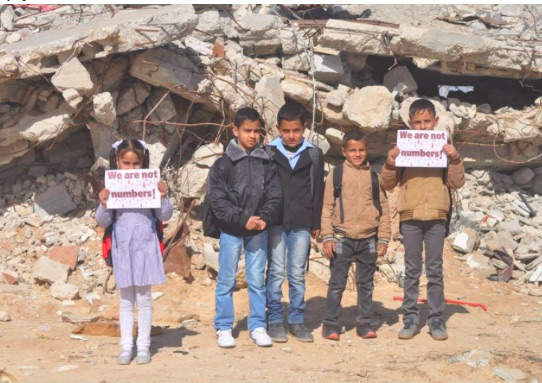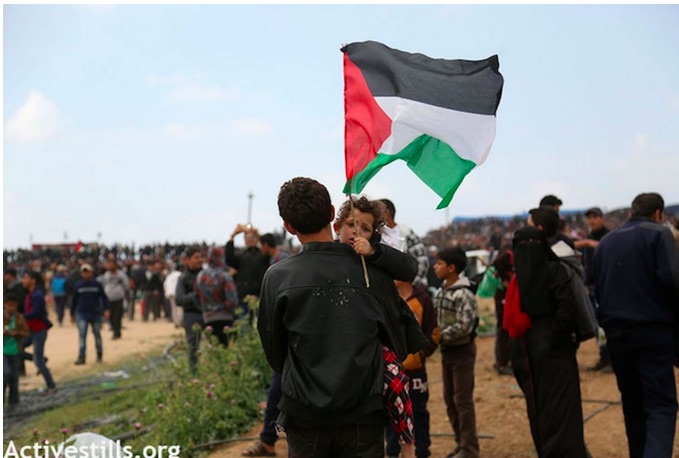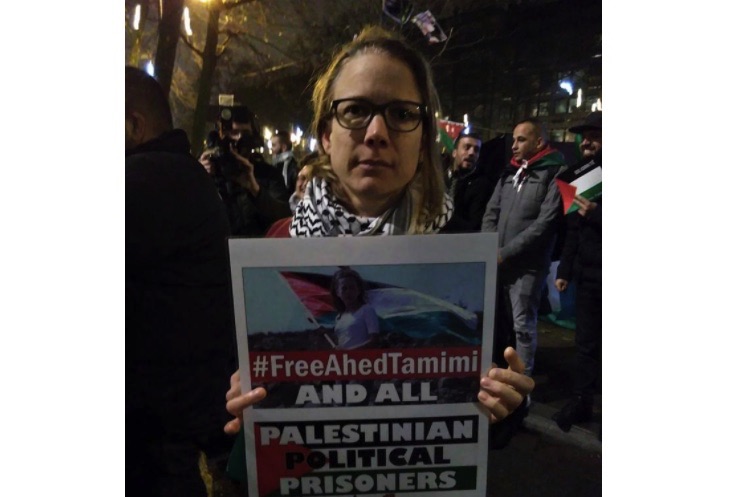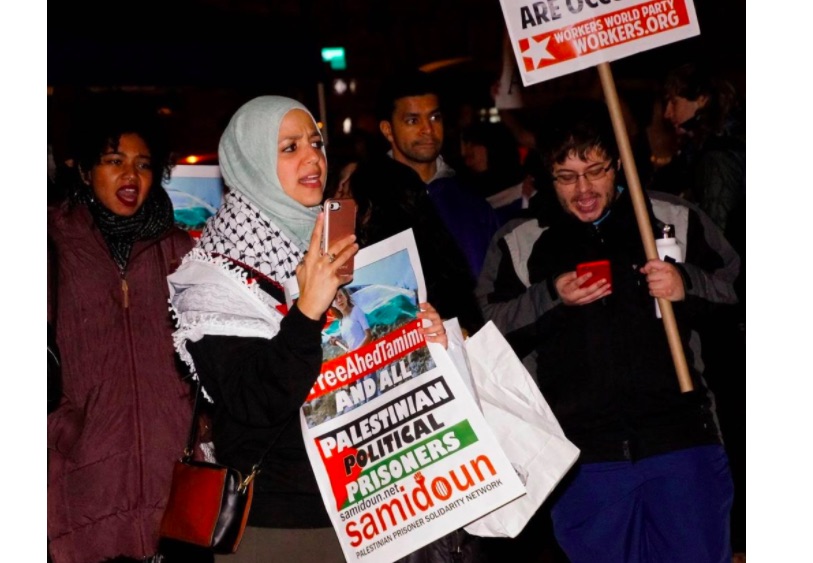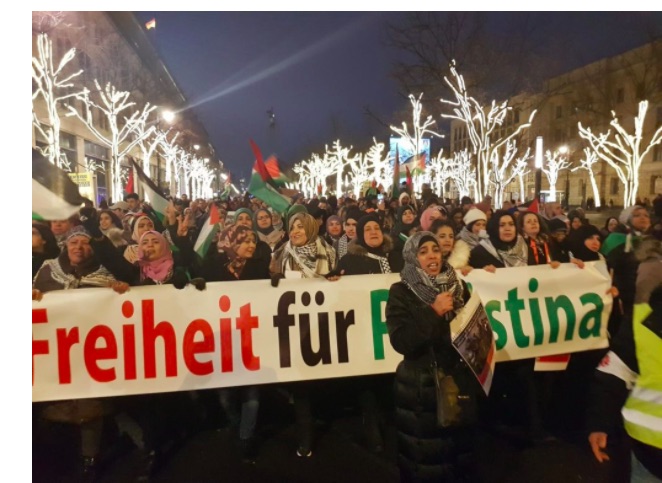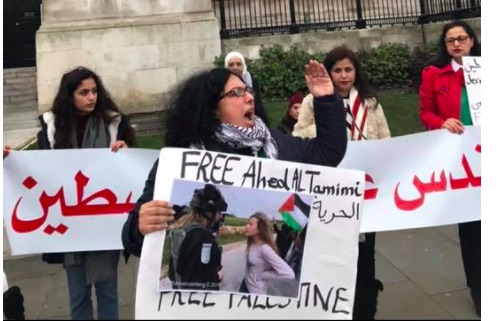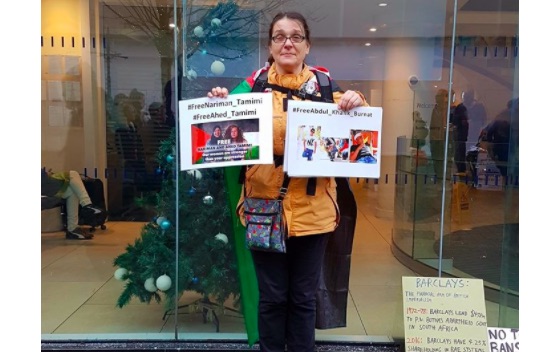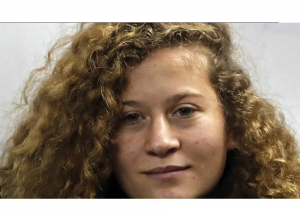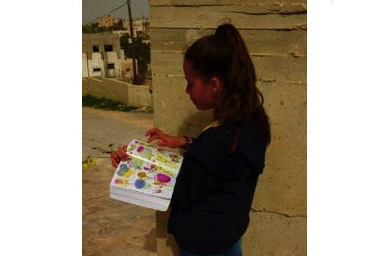TOLERANCE AND SOLIDARITY .
An article by Uri Avnery in Transcend.org
14 Apr 2018 – Write down: I, Uri Avnery, soldier number 44410 of the Israel army, hereby dissociate myself from the army sharpshooters who murder unarmed demonstrators along the Gaza Strip, and from their commanders, who give them the orders, up to the commander in chief.
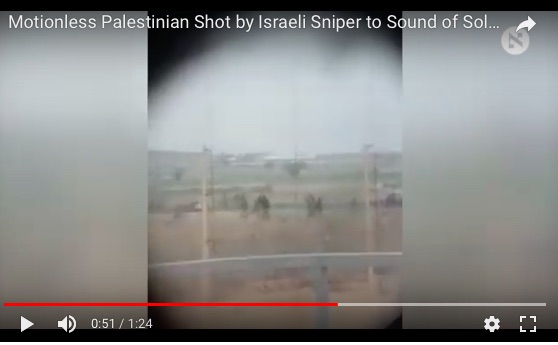
A frame from the video of the sniper shooting a demonstrator
We don’t belong to the same army, or to the same state. We hardly belong to the same human race.
IS MY government committing “war crimes” along the border of the Gaza Strip?
I don’t know. I am not a jurist.
It seems that officials of the International Criminal Court believe that the acts of our soldiers do constitute war crimes. They demand an international investigation.
To prevent that, our army command proposes an Israeli military investigation. That is manifestly ridiculous – an army investigating itself about acts committed on direct orders of the Chief of Staff.
As was published in advance, sharpshooters were posted along the border fence and ordered to kill “ringleaders” of the unarmed protesters on the other side of the fence. The Gaza leadership had announced that these unarmed protests were to take place every week, after Friday prayers, until Naqba Day.
During the first two Fridays, 29 unarmed people were shot dead and more than a thousand wounded by sharpshooters.
For me this is not a judicial question. It is a crime, not only against the unarmed protesters. It is also a crime against the State of Israel, against the people of Israel and against the Israeli army.
Since I was a member of that army on the day of its foundation, I think that it is also a crime against my comrades and me.
THIS WEEK a short video, recorded by a soldier at the time of such an action, was widely seen in Israel [See link to video above].
It shows the action from the angle of a soldier who was obviously standing next to a sharpshooter. The sharpshooter sees the demonstrators from a distance of hundreds of yards. The hairs of his sights move at random, than settle on an individual. He shoots. The person drops on the spot.
A joyous cry “Yesh” is heard all around from unseen soldiers who have been watching. “Yesh” means “got him”, a jubilant yell, such as would accompany a hunter’s success in killing a rabbit.
Many hundreds of thousands of Israelis have seen this film by now, since it was shown for the first time on TV. Except for a few articles and letters to the editor (in Haaretz), there has been no protest.
This did not happen overseas, in some remote colony. It happened right next to us, 45 minute’s drive from my home.
The killer was not a hardened mercenary. He – and the joyous soldiers around him – were just ordinary youngsters, drafted at the age of 18 like most Jewish Israelis.
All of them were just “following orders”. (Remember?) We have not heard of one single case of a soldier refusing orders.
UNTIL TWO weeks ago, I had the highest respect for our highest officer, the Chief of Staff, Gadi Eizenkot. Surrounded by officers who are mere military technicians, he seemed an officer who, in spite of his unmilitary appearance, was well capable of upholding the dignity of the army against the punk who serves as Minister of Defense.
No more. Eizenkot has given the murderous orders. Why, for heavens sake?
(Article continued in the right column)
Question for this article
Presenting the Palestinian side of the Middle East, Is it important for a culture of peace?
(Article continued from the left column)
Like the British in India and the white racists in the US, the Israeli government does not know how to deal with unarmed protest. It has never encountered it. It does not exist in Arab tradition.
By chance this week I saw the classic movie about Mahatma Gandhi. The British tried everything – they beat him and myriads of others into pulp, they shot thousands of others. When Gandhi and his followers suffered this torment and did not hit back, the British eventually admitted defeat and went away.
So did the white racist opponents of Martin Luther King in Alabama. A Palestinian follower of his came to this country at the beginning of the occupation and tried to convince his countrymen to try this method. The Israel army opened fire, and the Palestinians reverted to the armed struggle.
Not this time. The (violent) Islamic Hamas in the Gaza Strip calls on the population to try unarmed protest, tens of thousands follow. This can lead to unforeseen results. One of them is the sharpshooters’ order to kill more or less at random.
WHEN I stated publicly that I am ashamed, a reader accused me of hypocrisy. He cited from my two books about our (1948) War of Independence, in which I had described atrocities to which I was a witness.
Sure, there were atrocities (as in every war). The perpetrators were soldiers of all ethnic and social groups. But they were denounced by some of their comrades (also of all ethnic and social groups). Most soldiers were in the middle, following the most persuasive.
Now the picture is different. Not only is the shooting of the unarmed protesters, far from the fence, done by order, but there seem to be no other voices. The military and political leadership is united. Even in civilian society, voices against the mass murder are very few.
HOW DO the Israeli media react? Well, they don’t. This momentous event in Israel’s history is almost ignored.
Fortunately for the perpetrators, there are plenty of events to take our minds off them and their actions. President Bashar al-Assad has apparently used chemical weapons against his rebels. The Israeli media are having a feast. How awful! How barbarous! How Arab!
Then there is the problem of the 36,000 “illegal” (meaning non-Jewish) African workers who have entered Israel. The government wants to throw them out. Decent Israelis very properly want to prevent this. That is a full-time job. No time for the Gaza Strip.
And there is, of course, Holocaust Memorial Day, which happens conveniently this week. One can write endlessly about this awful chapter in our history. What is Gaza compared to this horrible event?
WHAT ABOUT our media?
The sorrowful fact is that the Israeli media have reverted to what they were in the early days of the state: an instrument of the government. It took my news magazine dozens of years to break that habit. For many years we had a decent press, with some wonderful journalists and broadcasters.
No more. A few are left, but the great majority of the press is now coordinated with the regime (“gleichgeschaltet” in German). Two minutes on Gaza. 20 minutes on what’s happening in Syria. 10 minutes for the latest (imaginary) outbreak of anti-Semitism in the British Labor Party.
Most of the journalists and broadcasters, honest and well-meaning people all, are not even conscious of what they are doing (or not doing). They are innocent of any other thoughts.
WHERE IS the “Left”? Where is the so-called “Center”?
They have not disappeared, as some lament. Far from it. A shift of some percent or a move of one of the small parties would suffice to topple Binyamin Netanyahu.
But they all seem to be paralyzed. Nobody dares to speak out against the killing, apart from some faint whispers. Even the many admirable groups of youngsters who fight against the occupation, each on some special sector, are silent about the Gaza killings.
No mass demonstrations. No huge protests. Nothing.
So we, too, are to blame. And perhaps more than others.
Please write down: I am guilty!
